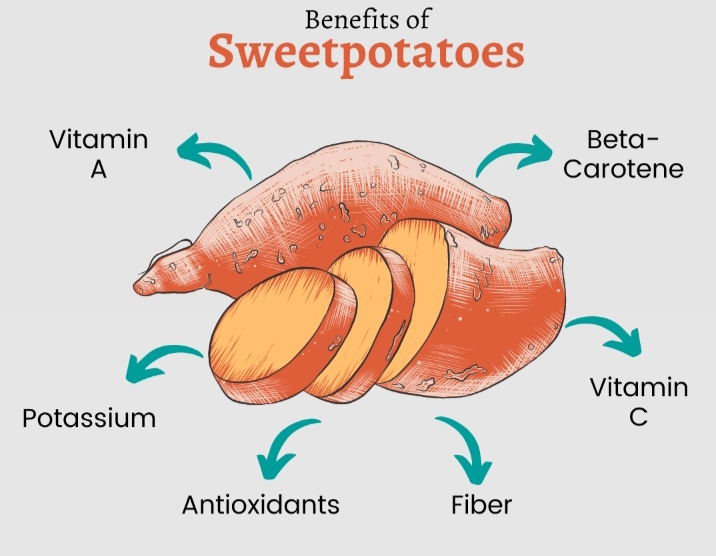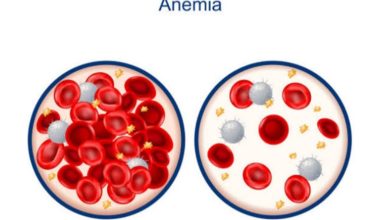10 Amazing Health Benefits of Sweet Potatoes and Their Nutritional Profile

Sweet potatoes (Ipomoea batatas) are a root vegetable that is highly valued for its rich nutrient profile and versatility in cooking. Native to Central and South America, they have become popular worldwide due to their health benefits and delicious taste. They belong to the Convolvulaceae family, which also includes morning glories.
Sweet potatoes are often confused with yams, but they are botanically distinct. While yams are starchy and dry, sweet potatoes tend to be sweeter and softer when cooked.
Nutritional Components of Sweet Potatoes
Sweet potatoes are packed with essential vitamins, minerals, and antioxidants. Here’s a breakdown of their primary nutritional components (per 100 grams of boiled sweet potato):
1.Calories: 86 kcal
2. Carbohydrates: 20.1 grams
- Sugars: 4.2 grams
- Dietary fiber: 3.3 grams
3.Protein: 1.6 grams
4.Fat: 0.1 grams
5. Vitamins:
- Vitamin A (from beta-carotene): 961 micrograms (approximately 192% of daily value)
- Vitamin C: 2.4 mg (4% of daily value)
- Vitamin B6: 0.2 mg (15% of daily value)
- Folate: 11 mcg (3% of daily value)
6. Minerals:
- Potassium: 337 mg (10% of daily value)
- Magnesium: 25 mg (6% of daily value)
- Iron: 0.6 mg (3% of daily value)
- Calcium: 30 mg (3% of daily value)
7. Antioxidants: Including anthocyanins (in purple sweet potatoes) and beta-carotene (in orange sweet potatoes), which help reduce oxidative stress in the body.
Read Also
Health Benefits of Eating Well-Balanced Diet.
Lemon Water Benefits: Refreshing Hydration and Wellness Boosting Remedies
10 Health Benefits of Sweet Potatoes
- Rich Source of Vitamin A: Sweet potatoes are incredibly high in beta-carotene, which the body converts into vitamin A. This nutrient is crucial for maintaining healthy vision, skin, and immune function. Consuming one medium-sized sweet potato provides more than the daily recommended intake of vitamin A.
- Supports Immune Function: Vitamin A, along with vitamin C, plays a key role in supporting the immune system. Both of these vitamins found in sweet potatoes help the body fight infections and maintain healthy mucosal surfaces, which are important barriers against pathogens.
- Rich in Antioxidants: Sweet potatoes, especially those with purple skin, are packed with antioxidants such as anthocyanins and beta-carotene. These compounds help combat oxidative stress and inflammation in the body, reducing the risk of chronic diseases like cancer and heart disease.
- Promotes Digestive Health: Sweet potatoes are an excellent source of dietary fiber, which aids in healthy digestion. Fiber promotes regular bowel movements, prevents constipation, and supports the growth of beneficial gut bacteria, leading to a balanced digestive system.
- Supports Skin Health: The high levels of beta-carotene and vitamin C in sweet potatoes help protect the skin from damage caused by free radicals. These nutrients also help in the production of collagen, a protein that gives the skin its structure and elasticity, reducing the appearance of wrinkles and promoting a youthful glow.
- Helps Regulate Blood Sugar: Although sweet potatoes are rich in carbohydrates, they have a low glycemic index (GI), meaning they cause a slower, more gradual rise in blood sugar levels. This makes them a good food choice for people with diabetes or those looking to manage their blood sugar levels.
- Boosts Heart Health: The fiber, potassium, and antioxidants in sweet potatoes contribute to heart health. Potassium helps regulate blood pressure by balancing the negative effects of sodium, while fiber lowers cholesterol levels. Additionally, antioxidants reduce inflammation, a major contributor to heart disease.
- Supports Brain Function: The antioxidants and nutrients in sweet potatoes, particularly the B vitamins and vitamin C, support brain health. They may help improve memory and cognitive function and may even reduce the risk of cognitive decline as you age.
- Aids in Weight Management: Because sweet potatoes are low in calories and high in fiber, they are filling and can help with weight management by reducing overall calorie intake. The fiber slows digestion, leading to prolonged feelings of fullness and helping prevent overeating.
- Promotes Healthy Liver Function: The high antioxidant content in sweet potatoes may also benefit liver health by reducing oxidative stress and inflammation. Additionally, they contain compounds that can aid in detoxification processes and improve liver function.

In conclusion, sweet potatoes are a nutrient-dense, versatile vegetable that offers numerous health benefits. Whether you consume them baked, boiled, mashed, or roasted, they provide a delicious way to boost your intake of vitamins, minerals, and antioxidants.
From supporting eye health to improving digestion and cardiovascular function, sweet potatoes should be a staple in any health-conscious diet.



